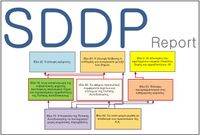|
Executive Summary
This paper reports the results of the second of a series of workshops organized by Future Worlds Center under the auspices of UNDEF. The dialogue was implemented in the context of the Reinventing Democracy in the Digital Era (UNDEF) project. The purpose of this project was to bring together young people from all around the world in an attempt to take apart and reconstruct the concept of democracy. The workshop was organized using the structured dialogic design process (SDDP) approach within the context of a rich web-based communication environment. This co-Laboratory was organized using the Structured Democratic Dialogue Process (SDDP) approach within the context of a rich web-based communication environment. It is organized by Australasian Initiative.
The Triggering Question (TQ) was
"What concrete action, project or product would you propose to solve a particular shortcoming of current systems of governance?"
In response to the TQ, the 17 participants came up with 35 Actions, which were categorized in 7 clusters. Following the voting process, 18 actions were structured to create the influence MAP shown below.
According to the participants of this workshop, appear to be the most influential were:
- Action Plan 3:Develop two way communication between citizens and government
- Action Plan 7:Use of different forms of visual media and communication to drive psychological change at local level
- Action Plan 9:Ways for inclusivity
- Action Plan 15: Human centered design for problem solving in governance
- Action Plan 18:Youth participation
- Action Plan 22: Creating awareness on the definition of democracy
Gallery
Participants
| Name | Country |
|---|---|
| Rafay Iqbal Ansari | Pakistan |
| Uzma Gul | Pakistan |
| Shagun Sharma | India |
| Tamzid Sikder | Bangladesh |
| Suraj Raj Pandey | Nepal |
| Sakshi Sharma | India |
| Gayan Rajapaksha | Sri Lanka |
| Shivam Aggarwal | India |
| Shadi Rouhshahbaz | Iran |
| Afsaneh Seifnaji | Iran |
| Manasvi Sathish | Iran |
| India |
